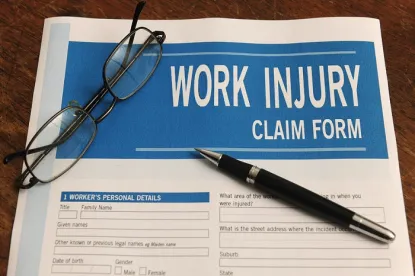On November 4, the Illinois Supreme Court released its decision in the much-awaited case of Folta v. Ferro Engineering, 2015 IL 118070, which considered whether an employee can bring an action against an employer outside of the Workers' Compensation Act and Occupational Diseases Act when the employee's injury or disease first manifests itself after the expiration of certain time limitations under those acts.
The court, in a 4-2 decision authored by Justice Theis, held that the employee's action is barred by the exclusive remedy provisions of the two acts. Justices Freeman and Kilbride dissented, and Justice Thomas took no part in the decision.
Short Facts
The facts of the case are rather straightforward: the decedent, James Folta, worked for Ferro Engineering from 1966 to 1970 and alleged that as part of his job duties, he was exposed to asbestos-containing products. Forty-one years later, James was diagnosed with mesothelioma, and one month later, in May 2011, he filed a civil law suit in the circuit court of Cook County against 15 defendants, including Ferro. Ferro moved to dismiss, raising the exclusive remedy provisions of the Workers' Compensation and Occupational Diseases Acts, pointing out that the claim was governed by the Act and was barred by the 25-year statute of limitations/statute of repose contained in section 6(c) of the two Acts.
Lower Court Rulings
The circuit court granted Ferro's motion, but the appellate court reversed, finding that an injured employee may bring a common law action against his employer where the injury is not compensable under the Act. The appellate court concluded that the term "compensable" must relate to the ability to recover under the Act, and because James' estate could not recover under the Acts, his claim was therefore not compensable.
Supreme Court Ruling
Ferro appealed to the Illinois Supreme Court, which reversed and upheld the dismissal based on exclusive remedy grounds. In discussing the scope of the exclusivity provisions under the Workers' Compensation Act, a majority of the court found the Act generally provides the exclusive means by which an employee can recover against an employer for a work-related injury. However, "an employee can escape the exclusivity provisions of the Act if the employee establishes that the injury: (1) was not accidental; (2) did not arise from his employment; (3) was not received during the course of employment; or (4) was not compensable under the Act." Folta, 2015 IL 118070, ¶ 14.
The majority focused on the fourth category, and noted it has had limited opportunity to address what was originally meant in its decision in Collier v. Wagner Castings Co., 81 Ill. 2d 229, 237 (1980), when the court used the phrase "not compensable" to carve out a category of injuries for which the exclusive remedy provision would not be applicable. Folta, 2015 IL 118070, ¶ 17. After reviewing Collier and numerous subsequent decisions, the majority observed, "[t]hese cases do not stand for the proposition that whether an injury is compensable is defined by whether there is an ability to recover benefits for a particular injury sustained by an employee." Id. ¶ 23.
Here, the majority explained, "there is no question that based on the allegations in the complaint, [the decedent] James's disease is the type of disease intended to fall within the purview of the Act." Id. ¶ 24. An "occupational disease," the majority said, "is defined as one 'arising out of and in the course of the employment.' *** A disease arises out of the employment if there is a 'causal connection between the conditions under which the work is performed and the occupational disease.'" Id. Moreover, "[t]he disease 'must appear to have had its origin … in a risk connected with the employment and to have flowed from that source as a rational consequence.'" Id. The majority concluded there was no dispute for purposes of this appeal that the decedent's disease was precipitated by occupational exposure to asbestos. Thus, "it is evident that the legislature intended that occupational diseases arising from workplace asbestos exposure are the type of injury contemplated to be within the scope of the Act." Id. ¶ 25.
Looking to the language of the two statutory provisions:
We agree that section 6(c) of the Workers' Occupational Diseases Act does bar Folta's right to file an application for compensation. That section provides that, "[i]n cases of disability caused by exposure to *** asbestos, unless application for compensation is filed with the Commission within 25 years after the employee was so exposed, the right to file such application shall be barred." *** Section 6(c) further provides that "[i]n cases of death occurring within 25 years from the last exposure to *** asbestos, application for compensation must be filed within 3 years of death ***."
Id. ¶ 32.
Based on the plain language of this section, the majority held "this provision acts as a statute of repose, and creates an absolute bar on the right to bring a claim." Id. ¶ 33. In contrast to a statute of limitations, which determines the time within which a lawsuit may be brought after a cause of action has accrued, a statute of repose extinguishes the action after a defined period of time, regardless of when the action accrued.
The majority found that the General Assembly intended to provide an absolute definitive time period within which all occupational disease claims arising from asbestos exposure must be brought. "Since James's last employment exposure to asbestos was in 1970, the 25-year period of repose has long since expired. The fact that Folta was not at fault for failing to file a claim sooner due to the nature of the disease is not a consideration that is relevant to a statute of repose. Although the statute barred Folta's claim before it had yet accrued, that is the purpose of such a provision." Id. ¶ 34.
The majority stated, "[t]o construe the scope of the exclusive remedy provisions to allow for a common-law action under these circumstances would mean that the statute of repose would cease to serve its intended function, to extinguish the employer's liability for a work-related injury at some definite time." Id. ¶ 35. "Further, this interpretation would directly contradict the plain language of the exclusive remedy provision which provides that the employer's liability is 'exclusive and in place of any and all other civil liability whatsoever, at common law or otherwise.'" Id. (emphasis in original).
The majority noted that "the fact that through no fault of the employee's own, the right to seek recovery under the acts was extinguished before the claim accrued because of the statute of repose does not mean that the acts have no application or that Folta was then free to bring a wrongful death action in circuit court. Rather, where the injury is the type of work-related injury within the purview of the acts, the employer's liability is governed exclusively by the provisions of those acts." Id. ¶ 36. The majority found that "[t]he acts do not prevent an employee from seeking a remedy against other third parties for an injury or disease. Rather, in this case, the acts restrict the class of potential defendants from whom Folta could seek a remedy, limiting Folta's recourse for wrongful death claims to third parties other than the employer. In this case, Folta named 14 defendant manufacturers of asbestos-related products. Folta was not left without any remedy." Id. ¶ 50.






 />i
/>i

